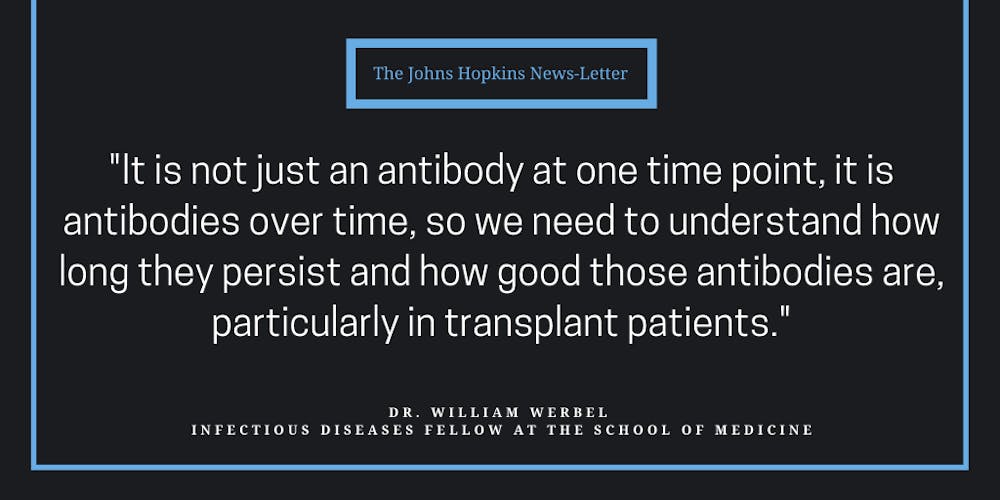Amid the pandemic, a variety of groups have been identified as being at a higher risk of developing serious symptoms if infected with the virus. At-risk groups include seniors and people with lung problems, heart disease or weakened immune systems. For this reason, as vaccine doses for COVID-19 became available, these groups were prioritized.
In an effort to better understand the immune response to the mRNA vaccines in immunocompromised individuals, a group of researchers at the School of Medicine conducted a study, published in JAMA, that evaluated the antibody response in solid organ transplant recipients after their first dose of a COVID-19 mRNA vaccine. Because transplant patients receive immunosuppression therapy after transplant surgery to prevent transplant rejection, they are considered at-risk.
In an interview with The News-Letter, Dr. Brian Boyarsky, a general surgery resident at the School of Medicine, described the motivation for his team’s study.
“In December, we found that only about 50% of transplant patients across the country were willing to be vaccinated,” he said. “Some of the reasons that they noted for their hesitation were that they did not know if the vaccine could lead to transplant rejection or if it would be effective.”
Of the 436 transplant recipients included in the study, 52% received the Pfizer-BioNTech vaccine and 48% received the Moderna vaccine. Their median age was 55.9 years and the median time since transplant was 6.2 years.
The study found that COVID-19 antibodies were detectable in 76 of 436 participants at a median of 20 days after the first dose of the COVID-19 mRNA vaccines. Interestingly, older transplant patients were less likely to develop an antibody response, and those who received the Moderna vaccine were more likely to develop an antibody response than those who received the Pfizer-BioNTech vaccine.
Boyarsky explained some possible reasons for the differences in the antibody response generated by each vaccine.
“There are several hypotheses as to why the Moderna shot appears to be more effective after the first dose compared to the Pfizer vaccine,” he said. “Number one is that the Moderna dose is higher than the Pfizer dose. Number two, whereas Moderna’s dosing interval is four weeks, Pfizer’s is only three weeks, so perhaps the immune system needs more time in an immunosuppressed patient to be prime[d] before getting that second booster dose. All of these things will need to be confirmed after the second dose.”
In an interview with The News-Letter, Dr. William Werbel, a third year fellow in infectious diseases at the School of Medicine, explained the importance of the team’s findings.
“Even though this is just one time point and one part of the immune system, our results are concerning because the messaging has been that vaccinated persons can engage with family and friends without masks, but with this low antibody response, we are concerned that those guidelines may not pertain to transplant patients,” he said.
Werbel highlighted that there is still a lot of work to be done to understand the immune response to the COVID-19 vaccines in immunosuppressed individuals.
“When we think about vaccine response, it is not just an antibody at one time point, it is antibodies over time, so we need to understand how long they persist and how good those antibodies are, particularly in transplant patients,” he said. “We also need to understand other parts of the immune system, like T-cell responses, which are antibody-independent cells that can kill viruses. The last thing is to understand how much memory is given to your body to lead to long-term protection.”
Boyarsky believes data regarding the second dose will provide more insight into vaccine efficacy in transplant patients, and he hopes long-term studies can shed light on the safety of these vaccines for transplant patients.
“We need to look at the second dose data because it can help answer a clinical question of how the whole vaccine series does,” he said. “The other piece that we are looking at is vaccine safety, so in the long term we can study if this new immunogenic vaccine is doing something that might contribute to transplant rejection.”





